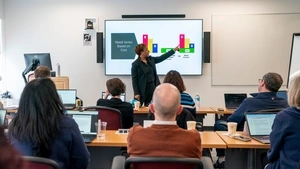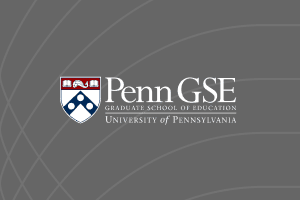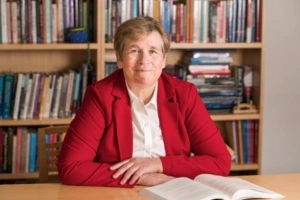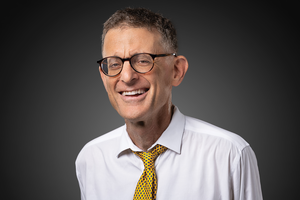As a senior professional and grandfather, Keith “Mac” McIntosh never imagined he’d return to the classroom. Still, the opportunity to pursue an Ed.D. at Penn GSE took him in an unexpected direction.
McIntosh, 61, is a student in Penn GSE’s Executive Doctorate in Higher Education Management. This two-year, executive-style program brings together a cohort of experienced leaders from higher education, private industry, and the government. Students work full-time while preparing for a career in higher education leadership, a balancing act that requires intense focus and commitment.
For his part, McIntosh juggles his role as the University of Richmond’s vice president for information services and chief information officer with his Penn GSE studies.
McIntosh’s journey to Penn GSE is unconventional. After serving in the United States Air Force for nearly 25 years and specializing in information technology, McIntosh decided to retire from the military in 2008 and search for his next challenge. His wife Penny discovered an IT position at Pima County Community College District in Tucson, Arizona, and McIntosh discovered the industries’ shared common values.
“What I love about the military and what transferred to higher education is they are both about service. You’re not chasing a job or getting a salary; you’re helping people,” he said.
McIntosh understood technology, but higher education was a new field. He credits his Pima County Community College manager, Kirk Kelly, the college's CIO and the person who hired McIntosh, for offering strong mentorship and guidance.
Kelly introduced him to EDUCAUSE, a nonprofit association for higher ed IT professionals. There, he met IT professionals from other U.S. and international schools and soaked up knowledge and information. He went on to serve on the EDUCAUSE board for four years, mentor young tech workers, and volunteer in a development program for mid-career professionals.
But it wasn’t long before McIntosh’s EDUCAUSE network led him to the University of Richmond. A fellow EDUCAUSE board member approached him about taking over her position when she retired, and he eventually succeeded her.
At Richmond, McIntosh immersed himself in the school’s technology infrastructure, management, and oversight. He is a member of the president’s cabinet, advising on tech policy, joined the school’s audit board to oversee cybersecurity, and created the first IT strategic plan and IT governance plan.
In addition to EDUCAUSE, McIntosh has been active in the National Association of College and University Business Officers, serving as a board member for six years. He is also a mentor for the Next Leaders Fellowship, which supports a group of early-career IT professionals.
These experiences broadened McIntosh’s ambitions, feeding a desire to move beyond tech and into higher education management; a doctoral program offered a path forward. Multiple colleagues recommended Penn GSE, and McIntosh conducted extensive research, contacting at least one member from each of the 20 previous cohorts.
McIntosh says Penn GSE’s high-quality faculty and rich, strategic curriculum are “the heart and soul of the program.”
He relies on his 18-person cohort for support and collaboration in and outside the classroom.
“This is an unusual experience we’re going through together, and we’ve all had highs and lows,” he noted.
The group recently traveled to India for two weeks to research and observe universities and another style of higher education management. McIntosh said the experience is an example of Penn GSE’s hands-on approach to learning.
McIntosh's interest in university leadership is the foundation of his dissertation, which explores the role of a college president in fostering the belonging of faculty, staff, and students. He visited three private liberal arts schools, observing presidents with varied leadership styles. In his observations, McIntosh says the most influential leaders surround themselves with strong teams.
He also observed leaders engaging with their school communities. For example, one president worked with staff seeking tuition benefits like faculty, while another frequently ate at the cafeteria to engage students on their wants and needs.
When McIntosh completes his studies, he would like to teach, continue his dissertation research, and collaborate with colleagues on new projects. His work with the Next Leaders Fellowship may be a foundation for study. Whatever his next step, Mcintosh’s Penn GSE experience is reshaping his future.
“I never thought of being a faculty member or a scholar before this program, but this program has a way of changing you,” he said. “When I have my degree, I think many opportunities will open up, and I’ll be ready.”
Media Inquiries
Penn GSE Communications is here to help reporters connect with the education experts they need.





